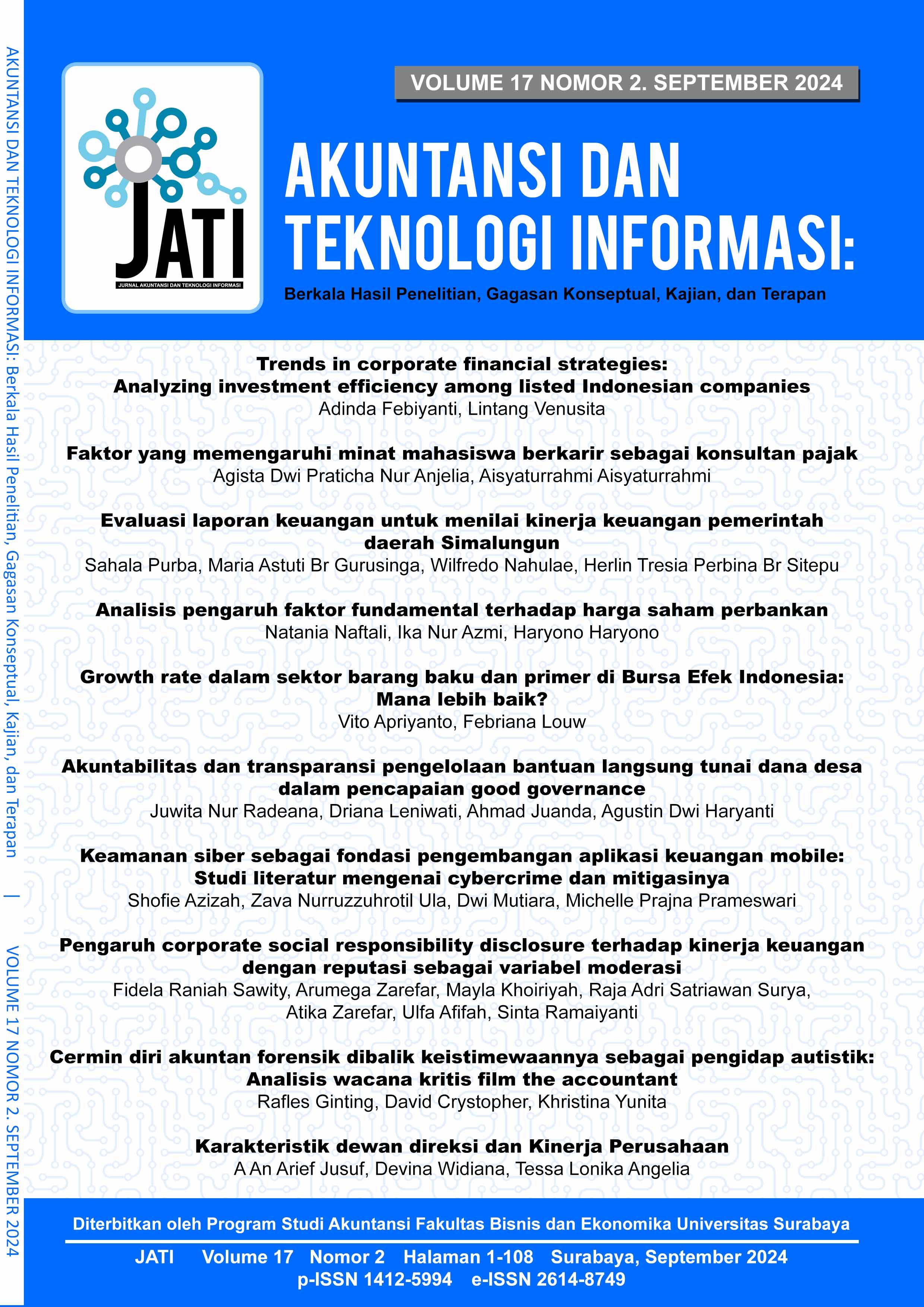Akuntabilitas dan transparansi pengelolaan bantuan langsung tunai dana desa dalam pencapaian good governance
 Abstract Views:
606 times
Abstract Views:
606 times
 PDF Downloads:
521 times
PDF Downloads:
521 times
Abstract
This research aims to understand the management of Village Fund Cash Transfer to establish good governance, based on phenomena that occurred in Sentul Village, Pasuruan Regency. This study analyzes the Village Fund Cash Transfer utilizing the interpretive paradigm and qualitative approach. Data is obtained by conducting in-depth interviews with the local authority and Sentul local inhabitants of Sentul Village, who were key informants. This research found that Village Fund Cash Transfer is interpreted as funds that must be accounted for, social safety nets, and relationships. The distribution of village fund cash transfers should comply with the concept of good governance to achieve a fair government. Empirically, in a broader sense, the Village Fund Cash Transfer is not only defined as aid for the poor, but also as funds that must be accounted for and a relationship of trust that must be maintained. This research focuses on analyzing the accountability and transparency of Village Fund Cash Transfer in Sentul Village to achieve good governance.
Downloads
References
Andriani, K. E., & Atmadja, A. T. (2022). Analisis akuntabilitas dan transparansi pengelolaan dana peturunan dalam kegiatan piodalan pura khayangan tiga di desa adat Alapsari desa Jinengdalem. Jurnal Ilmiah Akuntansi Dan Humanika, 12(1), 91–98.
Arfiansyah, A. (2020). Pengaruh sistem keuangan desa dan sistem pengendalian intern pemerintah terhadap akuntabilitas pengelolaan dana desa. Journal of Islamic Finance and Accounting, 3(1), 67–82. http://ejournal.iainsurakarta.ac.id/index.php/jifa
Arthana, I. K. (2019). Analisis faktor-faktor terjadinya kecurangan (fraud) dalam pengelolaan dana desa pada kecamatan Amabi Oefeto Timur. Jurnal Akuntansi : Transparansi Dan Akuntabilitas, 7(1), 35–43.
Arumdani, N., Nanda Rahmania, S., Nafi, Z., danTukiman Program Studi Administrasi Publik, ah, Upn, F., & Timur, J. (2021). Efektivitas bantuan langsung tunai dana desa (BLTDD) di desa Mojoruntut kecamatan Krembung. 2(5).
Aseh, S., Fahrul Gafar, T., & Zamhasari, D. Z. (2021). Problematika penyaluran bantuan langsung tunai dana desa (BLT DD) tahun 2020. Journal of Election and Leadership (JOELS), 30–40.
Astuti, P., Widayanti, R., & Damayanti, R. (2021). Tranparansi dan akuntabilitas pengelolaan dana desa dalam pencapaian good governance: studi kasus desa cepogo, kabupaten Boyolali. Jurnal Maksipreneur: Manajemen, Koperasi, Dan Entrepreneurship, 10(2), 164. https://doi.org/10.30588/jmp.v10i2.628
Dewi, R. C., & Suparno. (2022). Mewujudkan good governance melalui pelayanan publik. Jurnal Media Administrasi, 7(1), 78–90.
Djako, P., Panigoro, M., & Sudirman. (2022). Pengaruh pemberian bantuan langsung tunai (BLT) terhadap kesejahteraan masyarakat kelurahan Moodu kecamatan Kota Timur kota Gorontalo. Jambura Economic Education Journal, 4(2), 207.
Farida, V., Jati, A. W., & Harventy, R. (2018). Analisis Akuntabilitas Pengelolaan Akuntabilitas Pengelolaan Alokasi Dana Desa (ADD) di Kecamatan Candipuro Kabupaten Lumajang. Jurnal Akademi Akuntansi, 1 (1), 7–10. https://doi.org/10.22219/jaa.v1i1.6939
Herdiana, D., Wahidah, I., Nuraeni, N., & Salam, A. N. (2021). Implementasi kebijakan bantuan langsung tunai (BLT) dana desa bagi masyarakat terdampak covid-19 di kabupaten Sumedang. https://doi.org/10.35880/inspirasi.v11i1.175
Hoesada, J. (2019). Akuntansi Desa. Jakarta: Salemba
Jamal, Y., Mustanir, A., & Latif, A. (2020). Penerapan prinsip good governance terhadap aparatu desa dalam pelayanan publik di desa ciro-ciroe kecamatan watang pulu kabupaten sidenreng rappang (Vol. 8).
Leniwati, D., Widyastuti, A., Sholana, R., Latifah, S. W., & Mawardi, F. D. (2022). Interpreting the concept of debt based on Indonesian patron-client perspective. Journal of Accounting and Strategic Finance, 5(2), 215–232. https://doi.org/10.33005/jasf.v5i2.291
Lukito, Penny, Kusumastuti, (2014), Membumikan Transparansi Dan Akuntabilitas Kinerja Sektor Publik: Tantangan Demokrasi KeDepan. PT Gramedia Widiasarana Indonesia: Jakarta
Mahmudi. (2016). Buku Akuntansi Sektor Publik. Penerbit UII Press Yogyakarta..
Maulya, P., Samri, Y., Nasution, J., Syafina, L., Syariah, A., Dan, E., & Islam, B. (2023). Analisis pengelolaan anggaran dana desa BLT pada masa pandemi covid-19 tahun 2020 desa jaharun. 2(2), 143–152. https://doi.org/10.54259/akua.v2i2.1601
Purwanti, U. (2021). Transparansi Pengelolaan Dana Desa di Desa Melilian Kecamatan Gelumbang Kabupaten Muara Enim. Jurnal Ilmu Administrasi dan Studi Kebijakan, 3(2). https://doi.org/10.48093/jiask.v3i2.35
Putri, S. U. (2020). Analisis akuntabilitas berbasis sharia enterprise theory untuk upaya pengembangan bisnis rumah jahit akhwat di Makassar). NUKHBATUL ’ULUM: Jurnal Bidang Kajian Islam, 6(2), 187–203. https://doi.org/10.36701/nukhbah.v6i2.242
Saputra, D., & Fitriwati, L. (2023). Analisis transparansi dan akuntabilitas pemerintah dalam pengelolaan alokasi dana desa di desa X. Jurnal Akuntansi Kompetif.
Sofi, I. (2021). Efektivitas bantuan langsung tunai dana desa dalam pemulihan ekonomi desa. Indonesian Treasury Review : Jurnal Perbendaharaan, Keuangan Negara, Dan Kebijakan Publik, 6(3), 247–262. https://doi.org/10.33105/itrev.v6i3.280
Sugiyono. 2018. Metode Penelitian Kuantitatif. Bandung: Alfabeta.
Sutanto, H., & Hardiningsih, P. (2021). Akuntabilitas pengelolaan BLT-dana desa pada masa pandemi covid-19. InFestasi, 17(1), InPres. https://doi.org/10.21107/infestasi.v17i1.9932
Triana, E., & Rahman, E. (2023). Analisis akuntabilitas dan transparansi pengelolaan dana bantuan langsung tunai dana desa di desa Murutuwu kabupaten Barito Timur. Jurnal Ilmiah Ekonomi Bisnis, 9(2), 135–145.
Wicaksono, K. W. (2015). Akuntabilitas Organisasi Sektor Publik. JKAP (Jurnal Kebijakan Dan Administrasi Publik), 19(1), 17-26. https://doi.org/10.22146/jkap.7523
Zamzami, & Maulina, R. (2023). Pengaruh akuntabilitas pengelolaan dan optimalisasi penggunaan dana desa terhadap pengembangan badan usaha milik gampong (BUMG). Akuntansi Dan Teknologi Informasi, 16(1), 16–29. https://doi.org/10.24123/jati.v16i1.5332

This work is licensed under a Creative Commons Attribution-ShareAlike 4.0 International License.
- Copyright on articles is retained by the respective author(s), without restrictions. A non-exclusive license is granted to Akuntansi dan Teknologi Informasi (JATI) to publish the article and identify itself as its original publisher, along with the commercial right to include the article in a hardcopy issue for sale to libraries and individuals.
- Articles published in Akuntansi dan Teknologi Informasi (JATI) are licensed under a Creative Commons Attribution-ShareAlike 4.0 International license. You are free to copy, transform, or redistribute articles for any lawful purpose in any medium, provided you give appropriate credit to the original author(s) and the journal, link to the license, indicate if changes were made, and redistribute any derivative work under the same license.
- By publishing in Akuntansi dan Teknologi Informasi (JATI), authors grant any third party the right to use their article to the extent provided by the Creative Commons Attribution-ShareAlike 4.0 International license.

 DOI:
DOI:









